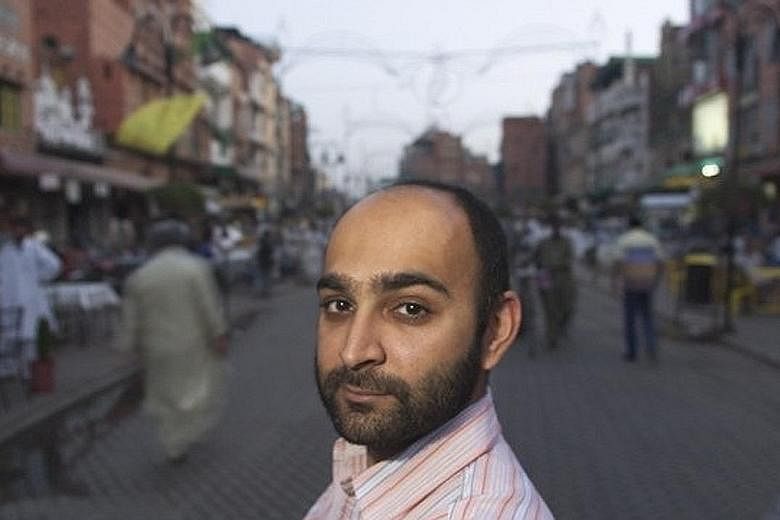In a city under siege by militants, doors have begun to open for those desperate enough to enter them.
These doors transcend space and reality, such that one might crawl into a supply cabinet in an abandoned dentist's office and emerge on the beaches of the Greek island of Mykonos.
In his fourth novel, Exit West, Pakistani author Mohsin Hamid takes on the harsh realities of the refugee crisis, but infuses them with a touch of magic.
In Exit West, young lovers Nadia and Saeed make the difficult choice to abandon their collapsing city and escape through a series of doors, each leading to a new place - a beach refugee camp, an empty holiday home filled with squatters, a hillside shanty town.
Hamid, 45, tells The Straits Times over the telephone from Lahore, Pakistan, where he lives: "I wanted to explore the migration apocalypse that so many politicians and people seem terrified of.
"Human equality requires that people should be able to move wherever they want. Nobody can say their ancestors evolved exactly where they themselves lived.
"It seems strange that in this moment in human history, we think migration can be stopped. It's never been stopped before."
He has been a migrant his whole life, having shuttled between Pakistan, the United States and Britain for much of his life. "In Pakistan, where I was born, I've lived less than half my life. I feel like a migrant even in Pakistan."
Hamid is best known for his second novel, The Reluctant Fundamentalist (2007), about a Pakistani Muslim's life in the US after the Sept 11 terrorist attacks. It was shortlisted for the Man Booker Prize and has since been made into a film starring Riz Ahmed.
Exit West's depiction of life in a city on the verge of civil war has struck a chord with readers. One young man went up to Hamid at a book signing to say he had lived in a war zone and could identify with the first part of the book.
Hamid says he did not do any research beyond watching the news of conflict in places such as the Syrian city of Aleppo. "I was more exploring my own feelings of what it would feel like if this occurred in the city I lived in. I just tried to feel like a human being living under the worst circumstances."
He leaves Nadia and Saeed's city unnamed, so that it could be any city. The lives they lead are not unfamiliar - they go on coffee dates and listen to music - which makes it especially disconcerting when their lives begin to fall apart. One moment, the mobile network is disconnected; the next, headless bodies are hanging in the streets.
"Very often, when we think about conflict and civil war, we think in realistic terms, observing people from the outside," says Hamid. "I wanted to explore it in novelistic terms, what it was like to actually be these people."
He introduced the matter-of-fact conceit of the doors, which allowed him to skip the weeks or months of the migration journey, so often the focus in the way the refugee crisis is written about, and explore instead the long-term effects of such an exodus.
Phone calls and Skype calls gave him the idea for the doors, which in the novel start opening all over the world. "I had the feeling that the world is collapsing in terms of distance because of modern technology, aeroplanes and the media. We live in a world where the doors already exist, emotionally."
He is married with a daughter, aged seven, and son, four, who are trying to steer his next project. "My daughter has asked me to write a children's book. I'll have to do it quickly, otherwise she'll be too old to read it."
Although Exit West centres largely on Nadia and Saeed's journey, there are vignettes of other migration experiences from different perspectives scattered throughout.
A door in a shed allows an old man in Amsterdam to start a relationship with an elderly painter in Rio de Janeiro; a young woman, headed to a peace march for migrants in Vienna, is harassed on the train; a woman in California feels as if she has migrated despite having lived in the same place all her life because it has changed so much.
"These micro-stories function like Impressionist paintings," says Hamid, "little dots of other stories that can be combined into a picture of a larger world".
Exit West came out in the wake of US President Donald Trump's temporary travel ban in January of citizens from seven Muslim-majority countries as well as refugees.
The first ban was blocked in the courts and a revised version is now being contested.
Hamid met the news of the travel ban with "a real sense of fear and sorrow". "Pakistan has not been included yet, but I've lived more than a third of my life in America and if I wasn't able to go, it would be devastating."
He has in the past been subject to airport profiling while travelling in the US and has been held for up to three or four hours in immigration. Once, after he had boarded a domestic flight, he was taken off the aircraft again to be searched.
He says: "I think that in a couple of hundred years, people will look back and think of this discrimination on the basis of geographic birthplace as absurd as that of race or gender or sexual orientation - something very odd.
"If Singapore in the future is submerged, the people of Singapore will need to leave. Should we say to your grandchildren that they be required to stay in Singapore and drown?
"No. They should be free to move to New York or London or wherever they want."


